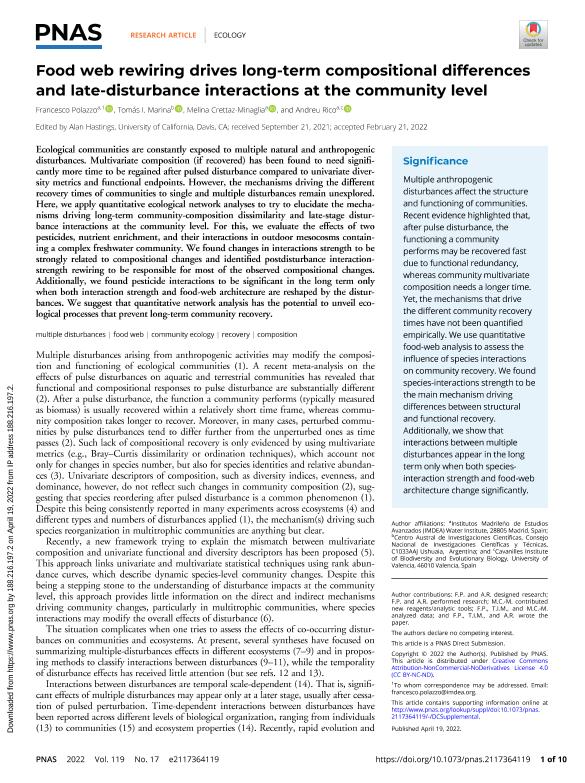Mostrar el registro sencillo del ítem
dc.contributor.author
Polazzo, Francesco
dc.contributor.author
Marina, Tomas Ignacio

dc.contributor.author
Crettaz Minaglia, Melina Celeste

dc.contributor.author
Rico, Andreu
dc.date.available
2023-04-17T17:29:09Z
dc.date.issued
2022-04
dc.identifier.citation
Polazzo, Francesco; Marina, Tomas Ignacio; Crettaz Minaglia, Melina Celeste; Rico, Andreu; Food web rewiring drives long-term compositional differences and late-disturbance interactions at the community level; National Academy of Sciences; Proceedings of the National Academy of Sciences of The United States of America; 119; 17; 4-2022
dc.identifier.issn
0027-8424
dc.identifier.uri
http://hdl.handle.net/11336/194224
dc.description.abstract
Ecological communities are constantly exposed to multiple natural and anthropogenic disturbances. Multivariate composition (if recovered) has been found to need significantly more time to be regained after pulsed disturbance compared to univariate diversity metrics and functional endpoints. However, the mechanisms driving the different recovery times of communities to single and multiple disturbances remain unexplored. Here, we apply quantitative ecological network analyses to try to elucidate the mechanisms driving long-term community-composition dissimilarity and late-stage disturbance interactions at the community level. For this, we evaluate the effects of two pesticides, nutrient enrichment, and their interactions in outdoor mesocosms containing a complex freshwater community. We found changes in interactions strength to be strongly related to compositional changes and identified postdisturbance interactionstrength rewiring to be responsible for most of the observed compositional changes. Additionally, we found pesticide interactions to be significant in the long term only when both interaction strength and food-web architecture are reshaped by the disturbances. We suggest that quantitative network analysis has the potential to unveil ecological processes that prevent long-term community recovery.
dc.format
application/pdf
dc.language.iso
eng
dc.publisher
National Academy of Sciences

dc.rights
info:eu-repo/semantics/openAccess
dc.rights.uri
https://creativecommons.org/licenses/by-nc-sa/2.5/ar/
dc.subject
COMMUNITY ECOLOGY
dc.subject
COMPOSITION
dc.subject
FOOD WEB
dc.subject
MULTIPLE DISTURBANCES
dc.subject
RECOVERY
dc.subject.classification
Ecología

dc.subject.classification
Ciencias Biológicas

dc.subject.classification
CIENCIAS NATURALES Y EXACTAS

dc.title
Food web rewiring drives long-term compositional differences and late-disturbance interactions at the community level
dc.type
info:eu-repo/semantics/article
dc.type
info:ar-repo/semantics/artículo
dc.type
info:eu-repo/semantics/publishedVersion
dc.date.updated
2023-04-17T11:09:53Z
dc.journal.volume
119
dc.journal.number
17
dc.journal.pais
Estados Unidos

dc.journal.ciudad
Washington DC
dc.description.fil
Fil: Polazzo, Francesco. Instituto Madrileño de Estudios Avanzados; España
dc.description.fil
Fil: Marina, Tomas Ignacio. Consejo Nacional de Investigaciones Científicas y Técnicas. Centro Austral de Investigaciones Científicas; Argentina
dc.description.fil
Fil: Crettaz Minaglia, Melina Celeste. Instituto Madrileño de Estudios Avanzados; España. Consejo Nacional de Investigaciones Científicas y Técnicas; Argentina
dc.description.fil
Fil: Rico, Andreu. Instituto Madrileño de Estudios Avanzados; España. Universidad de Valencia; España
dc.journal.title
Proceedings of the National Academy of Sciences of The United States of America

dc.relation.alternativeid
info:eu-repo/semantics/altIdentifier/url/https://pnas.org/doi/full/10.1073/pnas.2117364119
dc.relation.alternativeid
info:eu-repo/semantics/altIdentifier/doi/http://dx.doi.org/10.1073/pnas.2117364119
Archivos asociados
